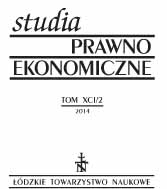Dobre praktyki ładu korporacyjnego oraz ich transfer do twardego prawa. Perspektywa interesariuszy Polskiego Rynku Kapitałowego
Corporate governance best practices and their transfer to hard law: The Polish Capital Market Stakeholders’ Perspective
Author(s): Izabela KoładkiewiczSubject(s): Economy
Published by: Łódzkie Towarzystwo Naukowe
Keywords: best practices of corporate governance; stakeholders of the Polish capital market audit committee
Summary/Abstract: The aim of the study was an assessment of experience in the realm of applying corporate governance best practices on the Polish capital market. Assessment of the process of transfer of the best practice component recommending the establishing of an audit committee in the supervisory board and its verification in practice over the years 2010–2012 was an additional research goal. Twelve respondents took part in the study. They represented different institutions present on the Polish capital market – e.g., the Warsaw Stock Exchange, Polish Financial Supervision Authority, Polish Institute of Directors, Association of Individual Investors, and the Association of Listed Companies – as well as representatives of the auditor, professional supervisory board member, and independent capital market expert communities. The study was qualitative in character and the research technique applied was the interview. Research results demonstrated the importance and need for preparing corporate governance best practices for Polish conditions. However, many weaknesses were observed in the way in which companies listed on Warsaw Stock Exchange applied them in practice. A basic weakness perceived by the interviewed respondents was “apparent action” taken by some listed companies. Most often this took on the form of information for the market stating compliance with best practices, where the reality was different. A second popular behavior was the way in which compliance reporting was carried out. In this case own reports were not written, but those of others were copied. Identified risks/threats to the formation of audit committees found confirmation in board practice. The main problems include difficulty in attracting professional members who possess knowledge and experience in the realm of finance and accounting to supervisory boards, and a lack of additional remuneration for members of the audit committee. The latter can also be an explanation as to why such professionals are difficult to invite to boards.
Journal: Studia Prawno-Ekonomiczne
- Issue Year: 2014
- Issue No: 91/2
- Page Range: 193-212
- Page Count: 20
- Language: Polish

